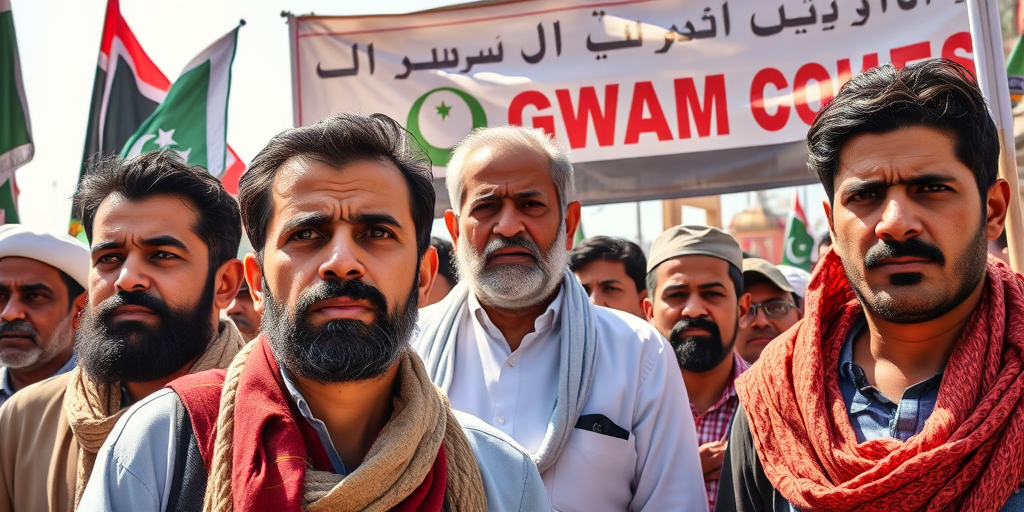Pakistan’s Inclusion of Baloch Activists on Terrorist Watchlist Sparks Human Rights Concerns
Amnesty International has raised alarm regarding Pakistan’s recent designation of 32 individuals, including Baloch activists, as “proscribed persons” under the Anti-Terrorism Act. Criticized for lacking due process, this decision places severe restrictions on these individuals, sparking a broader conversation about human rights and the suppression of dissent in the region.
The Controversial Move
The decision by the Pakistani authorities to categorize these activists as security threats has been met with significant opposition. Among the individuals proscribed are prominent figures like Dr. Sabiha Baloch and Sammi Deen Baloch, accused under section 11-EE, leading to strict limitations on their movement and financial activities. The move, according to Amnesty International’s Deputy Regional Director for South Asia, Babu Ram Pant, violates fundamental rights to liberty, privacy, and freedom of movement.
“This arbitrary designation without an opportunity for these individuals to contest it undermines their rights and leverages the law to silence dissenting voices,” Ram Pant said. Amnesty International argues that Pakistan’s anti-terror legislation falls short of international human rights standards, often wielded as a tool to stifle critical discourse.
Local Context: Struggles in Balochistan
The situation is particularly dire in Balochistan, a region frequently marked by tension between local activists and the government. The inclusion of Baloch activists on the terrorist watchlist highlights ongoing struggles in areas like Zehri, Khuzdar district. The region has been under strict lockdown since late September with limited movement and an internet shutdown, further curbing freedom of expression and communication.
Previous local efforts to address issues in Balochistan have often been contentious, including attempts by the government to manage dissent through military operations, raising concerns over reports of unlawful killings. A young activist from Quetta, who chose to remain anonymous due to safety concerns, commented, “We’ve seen these kinds of restrictions before, but this time it feels like an open assault on our right to speak and express.”
Community Impact and Reactions
The implications for the Baloch community are significant. Residents express fears that being labeled as security risks could unjustly damage reputations and limit their ability to engage in societal activities. The restrictions imposed by the watchlist severely hinder these activists’ ability to travel or manage financial dealings, essentially isolating them from public life.
Local human rights groups in Balochistan have also voiced their concerns. Hina Javed, a legal expert working with such a group, states, “These decisions erode trust in justice systems and further alienate communities that already feel marginalized. It’s important that we hold the government accountable and urge for legal reforms.”
Historical Connections and Precedents
The move to include activists on terrorist lists is not unprecedented. Past incidents in Pakistan have shown similar patterns of using anti-terror laws to suppress political opposition and activists. In many instances, these laws have been criticized for their broad applications that encroach on civil liberties. These developments follow previous events in the Khyber Pakhtunkhwa province, where concerns over civilian safety during military operations were similarly raised.
Long-term Implications
The long-term consequences of such decisions are deeply concerning. Human rights organizations fear that normalizing such lists could institutionalize the stifling of dissent and derail efforts for democratic reforms. Balochistan’s community members may face heightened scrutiny and restricted opportunities, affecting socio-economic well-being and peace in the region.
Calls for reform have been adamant, with Amnesty International urging Pakistan to comply with international standards by allowing individuals listed as security risks to contest their status in independent courts. Furthermore, they demand transparent investigations into reported abuses during military operations, emphasizing the urgency of these demands to prevent future escalation in Balochistan.
Voices of Advocacy and Resources
Amnesty International consistently stresses global engagement in addressing human rights violations. Through campaigns like “Write for Rights,” they strive to mobilize international support demanding justice in affected regions. Additionally, their robust platform offers resources, education, and volunteer opportunities to inform and involve global communities.
Community members in Pakistan, especially in the diaspora, look for avenues to support efforts for fair treatment and justice for Baloch activists. International attention and diplomatic pressure remain vital components in impacting meaningful change.
In conclusion, the inclusion of Baloch activists on Pakistan’s terrorist watchlist presents an urgent human rights challenge. As the situation unfolds, the drive for transparency and justice in the country remains a critical focus for local and international communities. It’s a narrative of broader socio-political dynamics underscoring community interest in fundamental freedoms and fairness. With sustained advocacy and engagement, there’s hope for progress toward aligning Pakistani legal frameworks with principles that prioritize and safeguard its citizens’ rights.







